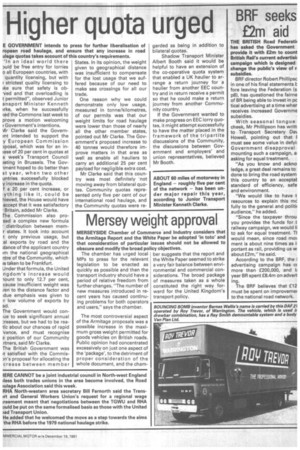Higher quota urged
Page 5

If you've noticed an error in this article please click here to report it so we can fix it.
E GOVERNMENT intends to press for further liberalisation of ropean road haulage, and ensure that any increase in road ulage quotas takes account of this country's requirements.
'In an ideal world there DuId be free entry for lorries o all European countries, with quantity licensing, but with
strictest quality licensing to Ike sure that safety is ob-ved and that overloading is t permitted", observed Junior ansport Minister Kenneth irke, when he successfully (ed the Commons last week to prove a motion welcoming Government's intentions.
Vlr Clarke said the Governmt intended to support the y European Commission )posal, which was for an in)ase of 20 per cent in quotas at s week's Transport Council )eting in Brussels. The Goviment hoped to do better than st year, when two other untries successfully blocked y increase in the quota.
f a 20 per cent increase, or ything like it, could be nieved, the House would have accept that it was satisfactory • Britain, added Mr Clarke. The Commission also prosed a complex new formula • distribution between memr states. It took into account t only previous usage, but :al exports by road and the ;tance of the applicant country im the national geographical ntre of the Community, which is taken to be Frankfurt.
Under that formula, the United ngdom's increase would iount to only 12.7 per cent, cause insufficient weight was /en to the distance factor and due emphasis was given to r low volume of exports by ad.
The Government would conlue to seek significant annual ;reases, but we had to be reatic about our chances of rapid vance, and must recognise a position of our Community rtners, said Mr Clarke.
The British Government was it satisfied with the Commism's proposal for allocating the crease between member States. In its opinion, the weight given to geographical distance was insufficient to compensate for the lost usage that we suffered because of our need to make sea crossings for all our trade.
One reason why we could demonstrate only low usage, measured in tonne/kilometres, of our permits was that our weight limits for road haulage were lower than those of nearly all the other member states, pointed out Mr Clarke. The Government's proposed increase to 40 tonnes would therefore improve matters in that area as well as enable all hauliers to carry an additional 25 per cent payload for negligible extra cost.
Mr Clarke said that this country was most definitely -not moving away from bilateral quotas. Community quotas represented only five per cent of our international road haulage, and the Community quotas were re
garded as being in addition to bilateral quotas.
Shadow Transport Minister Albert Booth said it would be helpful to have an extension of the co-operative quota system that enabled a UK haulier to arrange a return journey for a haulier from another EEC country and in return receive a permit so that he could make a return journey from another Community country.
If the Government wanted to make progress on EEC lorry quotas, it might attempt successfully to have the matter placed in the framework of the tripartite discussions of the Community, the discussions between Government and employers' and union representatives, believed Mr Booth.






































